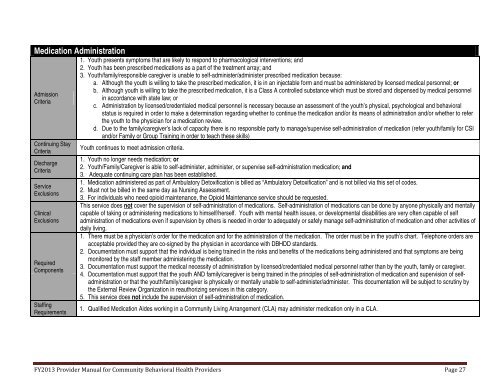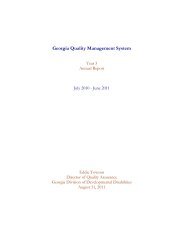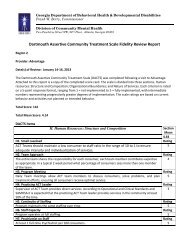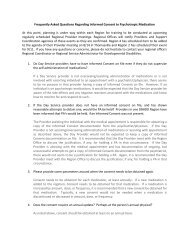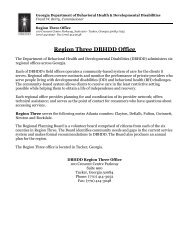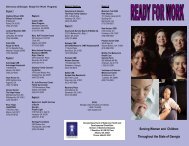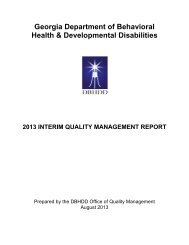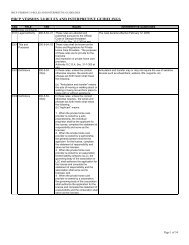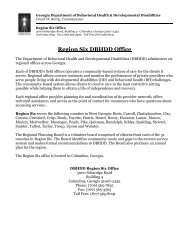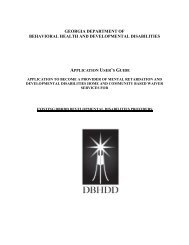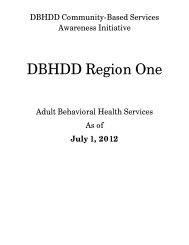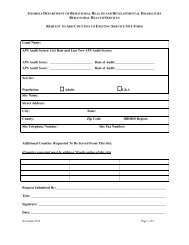PART I - Department of Behavioral Health and Developmental ...
PART I - Department of Behavioral Health and Developmental ...
PART I - Department of Behavioral Health and Developmental ...
Create successful ePaper yourself
Turn your PDF publications into a flip-book with our unique Google optimized e-Paper software.
Medication AdministrationAdmissionCriteriaContinuing StayCriteriaDischargeCriteriaServiceExclusionsClinicalExclusionsRequiredComponentsStaffingRequirements1. Youth presents symptoms that are likely to respond to pharmacological interventions; <strong>and</strong>2. Youth has been prescribed medications as a part <strong>of</strong> the treatment array; <strong>and</strong>3. Youth/family/responsible caregiver is unable to self-administer/administer prescribed medication because:a. Although the youth is willing to take the prescribed medication, it is in an injectable form <strong>and</strong> must be administered by licensed medical personnel; orb. Although youth is willing to take the prescribed medication, it is a Class A controlled substance which must be stored <strong>and</strong> dispensed by medical personnelin accordance with state law; orc. Administration by licensed/credentialed medical personnel is necessary because an assessment <strong>of</strong> the youth’s physical, psychological <strong>and</strong> behavioralstatus is required in order to make a determination regarding whether to continue the medication <strong>and</strong>/or its means <strong>of</strong> administration <strong>and</strong>/or whether to referthe youth to the physician for a medication review.d. Due to the family/caregiver’s lack <strong>of</strong> capacity there is no responsible party to manage/supervise self-administration <strong>of</strong> medication (refer youth/family for CSI<strong>and</strong>/or Family or Group Training in order to teach these skills)Youth continues to meet admission criteria.1. Youth no longer needs medication; or2. Youth/Family/Caregiver is able to self-administer, administer, or supervise self-administration medication; <strong>and</strong>3. Adequate continuing care plan has been established.1. Medication administered as part <strong>of</strong> Ambulatory Detoxification is billed as “Ambulatory Detoxification” <strong>and</strong> is not billed via this set <strong>of</strong> codes.2. Must not be billed in the same day as Nursing Assessment.3. For individuals who need opioid maintenance, the Opioid Maintenance service should be requested.This service does not cover the supervision <strong>of</strong> self-administration <strong>of</strong> medications. Self-administration <strong>of</strong> medications can be done by anyone physically <strong>and</strong> mentallycapable <strong>of</strong> taking or administering medications to himself/herself. Youth with mental health issues, or developmental disabilities are very <strong>of</strong>ten capable <strong>of</strong> selfadministration <strong>of</strong> medications even if supervision by others is needed in order to adequately or safely manage self-administration <strong>of</strong> medication <strong>and</strong> other activities <strong>of</strong>daily living.1. There must be a physician’s order for the medication <strong>and</strong> for the administration <strong>of</strong> the medication. The order must be in the youth’s chart. Telephone orders areacceptable provided they are co-signed by the physician in accordance with DBHDD st<strong>and</strong>ards.2. Documentation must support that the individual is being trained in the risks <strong>and</strong> benefits <strong>of</strong> the medications being administered <strong>and</strong> that symptoms are beingmonitored by the staff member administering the medication.3. Documentation must support the medical necessity <strong>of</strong> administration by licensed/credentialed medical personnel rather than by the youth, family or caregiver.4. Documentation must support that the youth AND family/caregiver is being trained in the principles <strong>of</strong> self-administration <strong>of</strong> medication <strong>and</strong> supervision <strong>of</strong> selfadministrationor that the youth/family/caregiver is physically or mentally unable to self-administer/administer. This documentation will be subject to scrutiny bythe External Review Organization in reauthorizing services in this category.5. This service does not include the supervision <strong>of</strong> self-administration <strong>of</strong> medication.1. Qualified Medication Aides working in a Community Living Arrangement (CLA) may administer medication only in a CLA.FY2013 Provider Manual for Community <strong>Behavioral</strong> <strong>Health</strong> Providers Page 27


